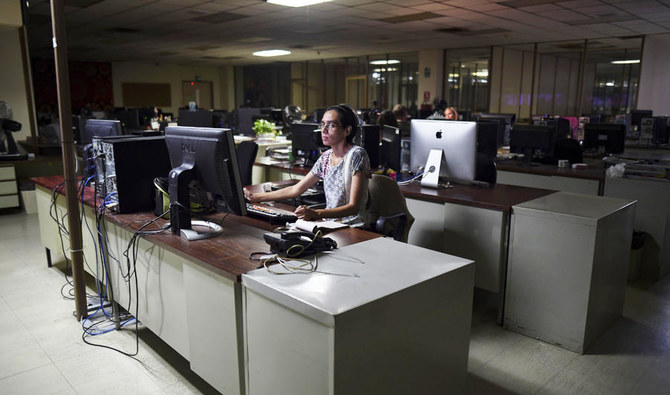CARACAS: Starved of advertising revenue and battling a stranglehold on the newspaper industry by the government, Venezuela’s independent media have been decimated by the country’s years-long crisis — with many migrating online to survive.
“It was a course we couldn’t get away from,” Jorge Makriniotis, manager at the 75-year-old El Nacional, told AFP.
The newspaper ran its last physical edition — which had already dropped from 72 to just 16 pages — on December 13 last year.
Like many other former print media, it is only available on the Internet now.
In 2013, Venezuela’s socialist government created a state-run company to control the import and distribution of paper.
Carlos Correa, director of the Espacio Publico non-governmental organization, said the move created “discriminatory dynamics” that saw pro-regime media favored — while others were starved of printing paper, and advertising revenue.
Since then, 58 daily newspapers have ceased circulation, Correa says.
“There’s never been an official response” to the claims from independent media, said Gisela Carmona, the director of El Impulso — one of the papers that has migrated online, requiring an investment of more than a million dollars.
After 100 years in print, the newspaper disappeared from the streets in February 2018, having received no paper for 12 months.
Beyond controlling paper supply, critics accuse the Venezuelan government of oppressing dissenting media voices across the board.
The national union of press workers has denounced a “systematic policy” of asphyxiation as dozens of independent radio and television stations also closed.
“Over the past years, the Government has attempted to impose a communicational hegemony by enforcing its own version of events and creating an environment that curtails independent media,” said UN High Commissioner for Human Rights Michelle Bachelet in a report on Venezuela earlier this month.
One example from 2018 saw El Nacional lose a case brought by Diosdado Cabello, widely regarded as the most powerful regime figure after President Nicolas Maduro, for having published drug-trafficking allegations made against him in the Spanish press.
The economic crisis had a major impact on the media too, as on all businesses.
Five years of recession and rampant hyperinflation — which the International Monetary Fund expects to reach a staggering 10 million percent this year — have decimated advertising revenues.
Carminda Marquez opened a kiosk in Caracas 18 years, selling dozens of newspapers and other publications.
“Now I sell three or four,” said the 80-year-old.
Regional newspaper Panorama, which served Venezuela’s second city Maracaibo, struggled on until May 14 when “a perfect storm” of massive power cuts finally sounded it’s physical death knell, its editorial director Maria Ines Delgado told AFP.
Panorama never had to lay off any journalists as one by one they resigned and left for foreign shores.
“Every time we replaced one, another left,” Delgado said from a near-empty editorial room.
Like El Impulso, Panorama is now fed by banner advertising.
The move online has not solved independent media’s myriad problems, though, least of all the ability to reach readers.
Between frequent power outages, patchy Internet and the second slowest connectivity in Latin America — after landlocked Paraguay — readers have trouble loading pages, especially on smartphones.
“We know nothing any more,” complained Belkis Nava, who used to read Panorama.
Despite the difficulties, some journalists have launched new media directly on the Internet, such as El Pitazo.
Specializing in investigative journalism — it won the prestigious Ortega y Gasset prize awarded by Spanish newspaper El Pais this year — El Pitazo supported itself through a 2017 crowdfunding campaign, director Cesar Batiz told AFP.
However, like other news websites, El Pitazo has come under cyberattack — four times over two years.
Before the first attack in 2017, El Pitazo had 110,000 visits a day. Traffic has since dropped by more than half, and 65 percent of that comes from abroad.
“People aren’t receiving information,” said Melanio Escobar, the director of the Redes Ayuda (Network Help) NGO.


























